中考英语专题复习之动词
图片预览
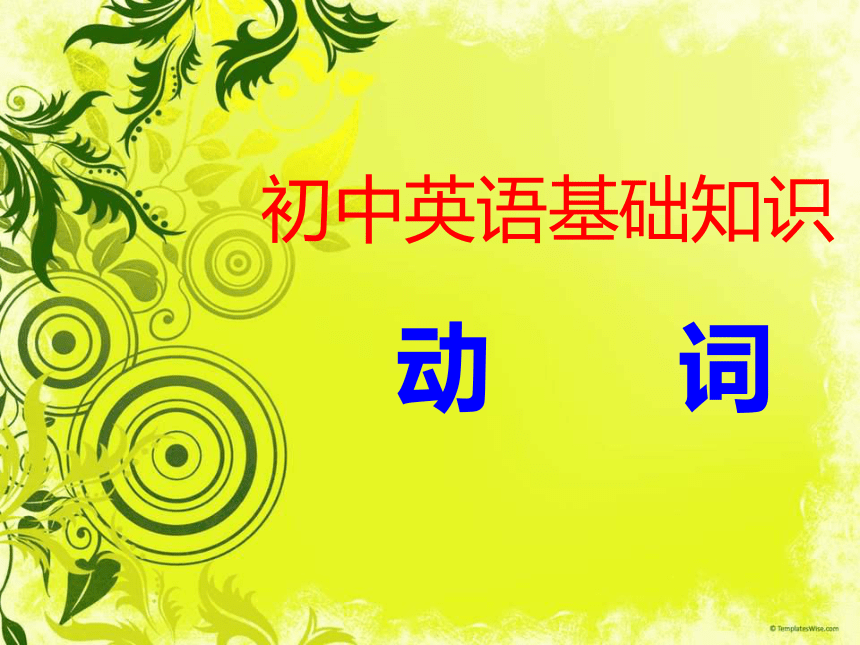
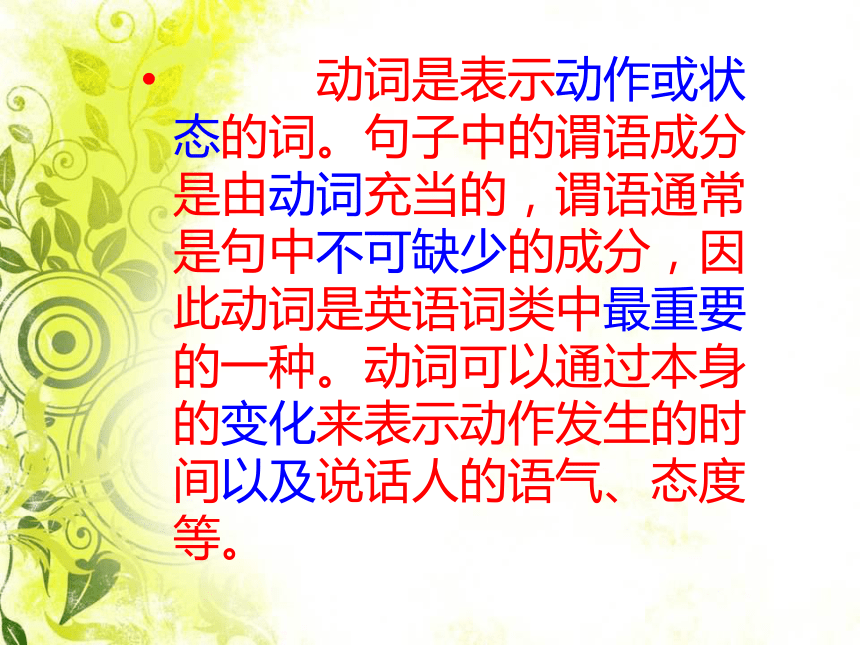
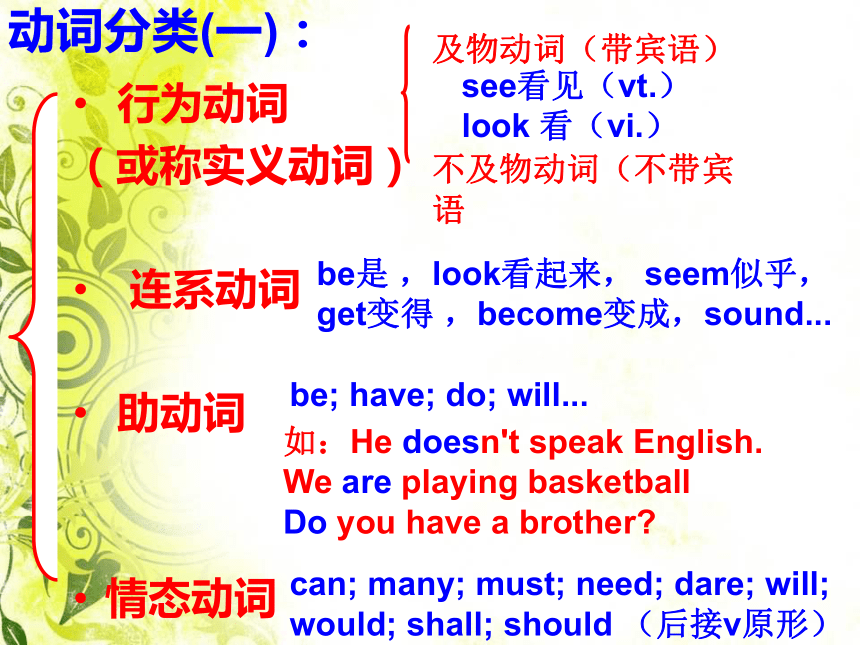
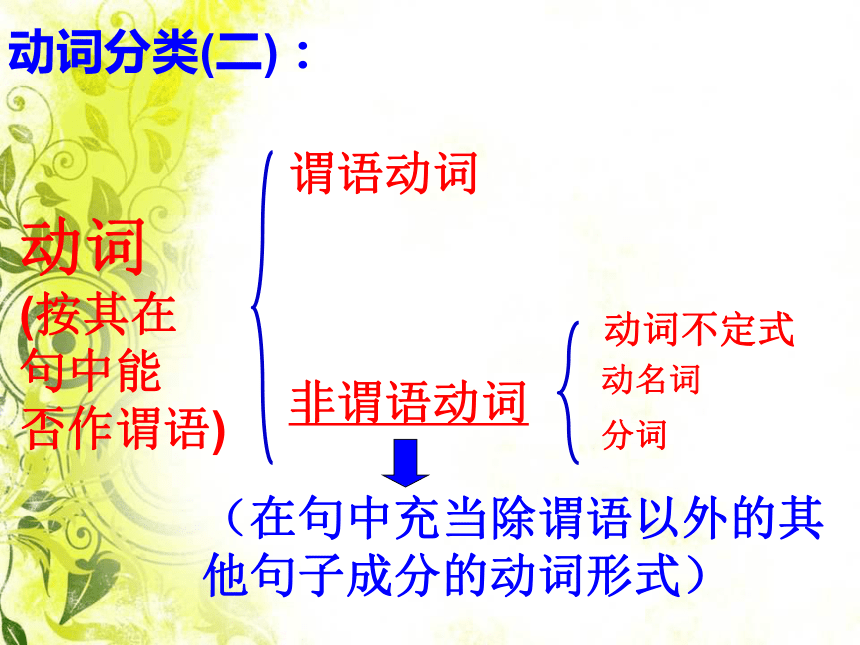
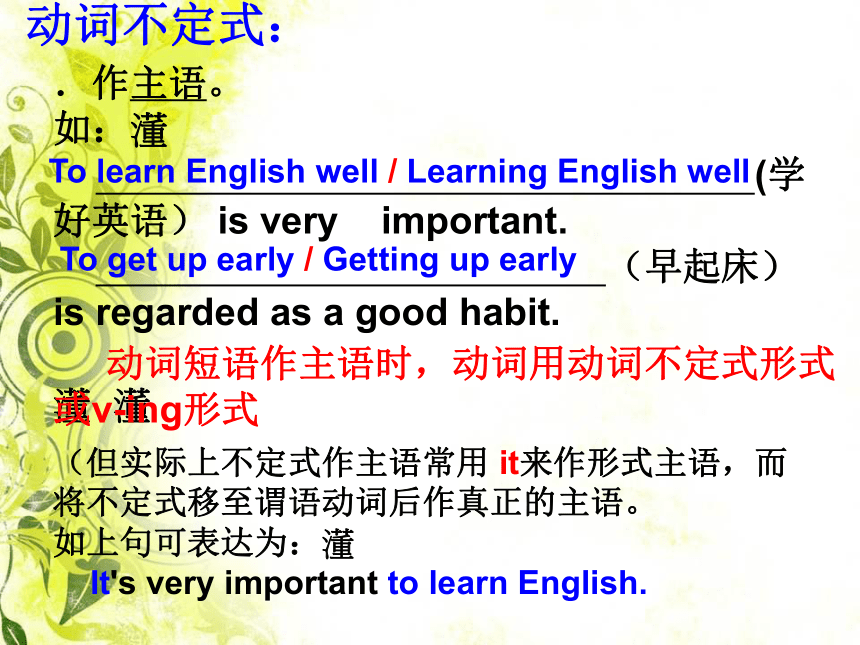
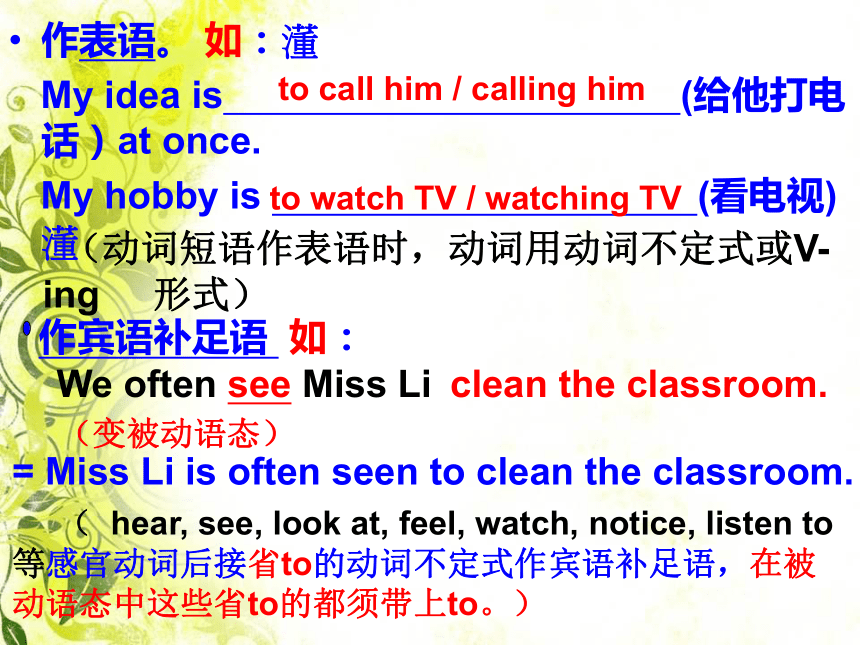
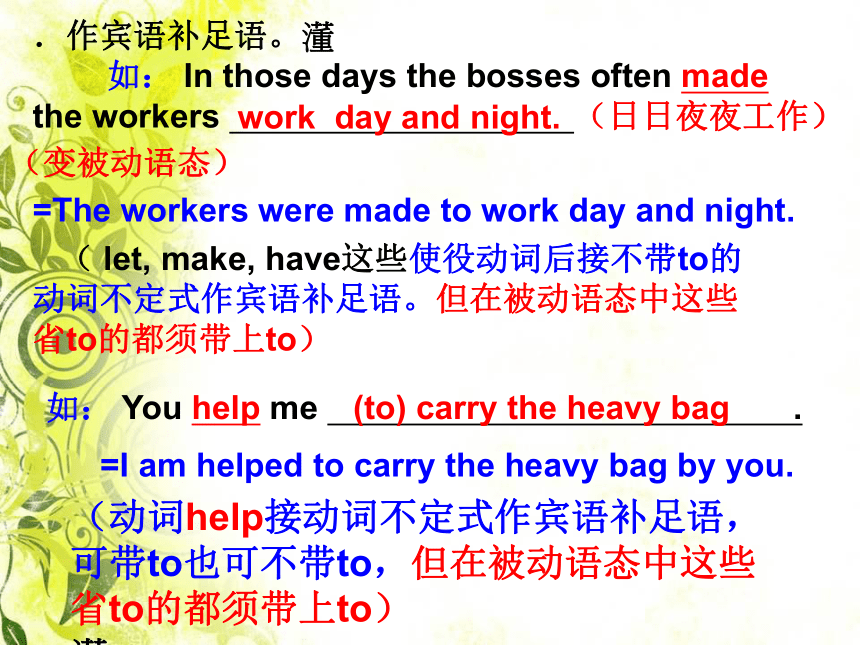
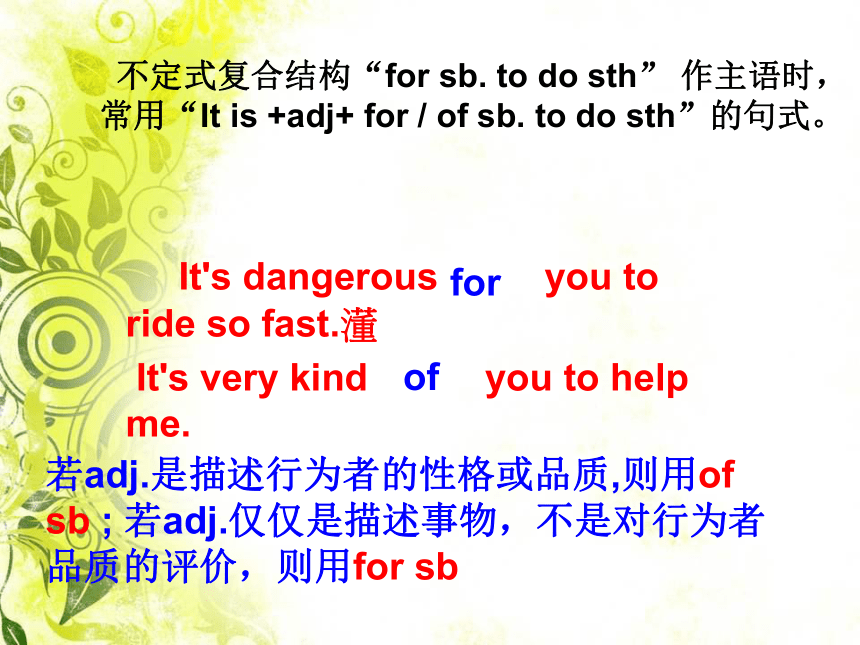
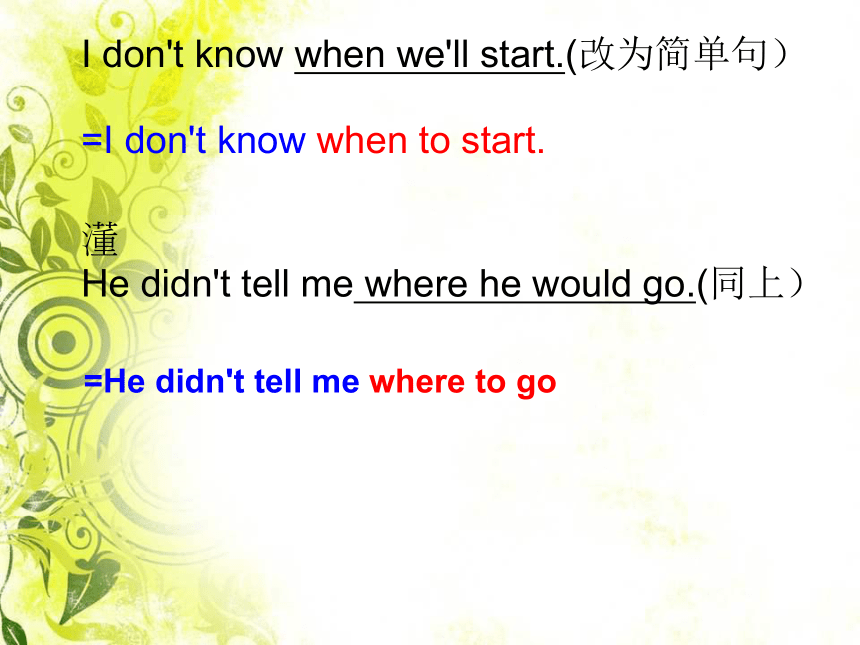
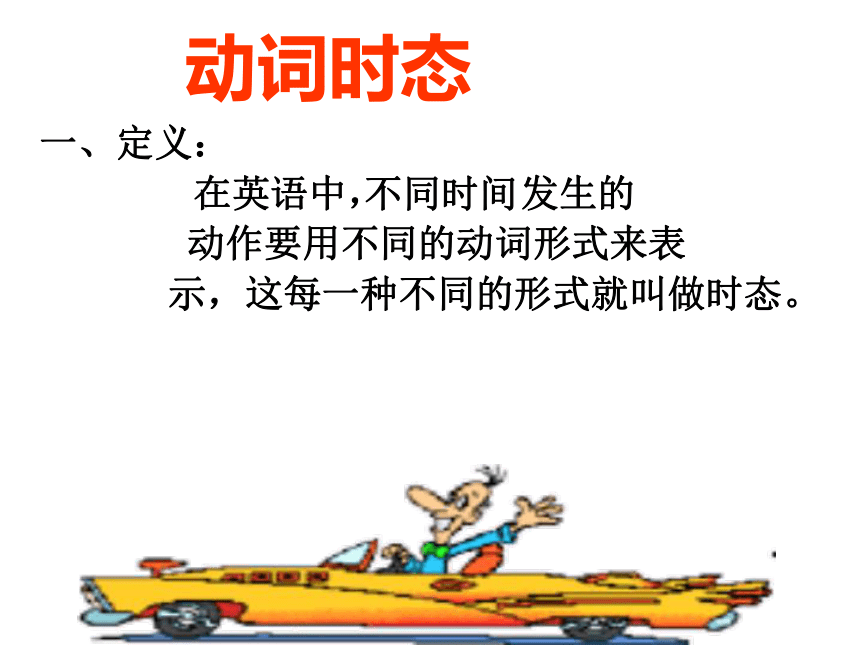
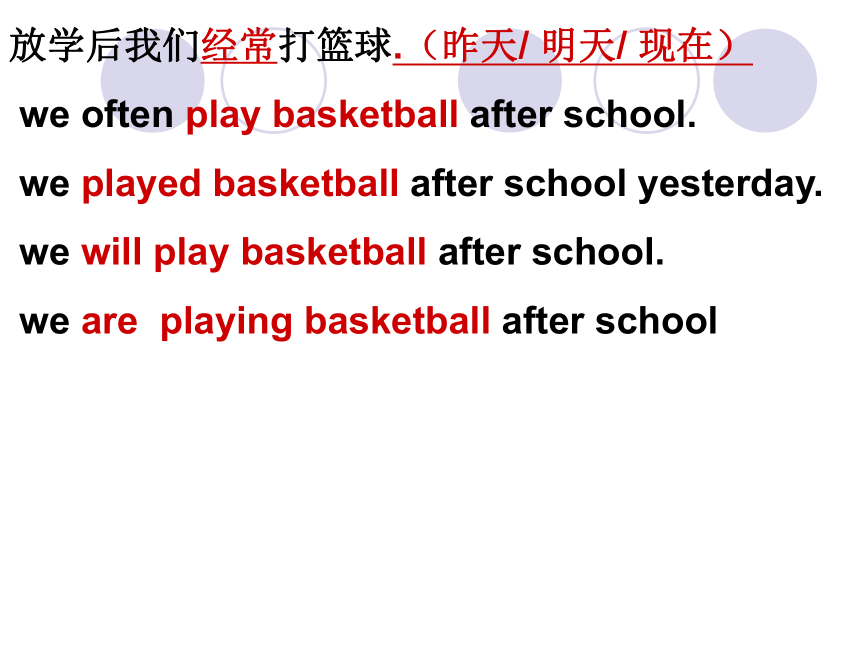
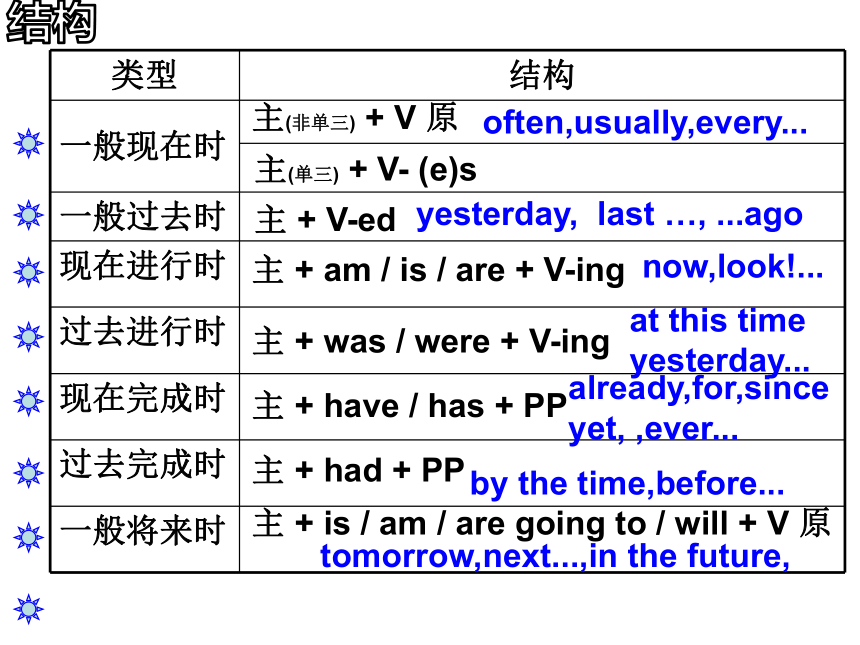
文档简介
课件37张PPT。初中英语基础知识动 词 动词是表示动作或状态的词。句子中的谓语成分是由动词充当的,谓语通常是句中不可缺少的成分,因此动词是英语词类中最重要的一种。动词可以通过本身的变化来表示动作发生的时间以及说话人的语气、态度等。 动词分类(一): 行为动词
(或称实义动词)
连系动词
助动词
情态动词 see看见(vt.)
look 看(vi.) 及物动词(带宾语)
不及物动词(不带宾语be是 ,look看起来, seem似乎, get变得 ,become变成,sound...be; have; do; will...
如:He doesn't speak English.
We are playing basketball
Do you have a brother?can; many; must; need; dare; will; would; shall; should (后接v原形)
动词
(按其在
句中能
否作谓语)谓语动词
非谓语动词
动词分类(二):(在句中充当除谓语以外的其他句子成分的动词形式)动词不定式动名词分词动词不定式:.作主语。
如:?
(学好英语) is very important.
(早起床)is regarded as a good habit.
? ? To learn English well / Learning English well To get up early / Getting up early 动词短语作主语时,动词用动词不定式形式或v-ing形式(但实际上不定式作主语常用 it来作形式主语,而将不定式移至谓语动词后作真正的主语。
如上句可表达为:?
It's very important to learn English.作表语。 如:?
My idea is (给他打电话)at once.
My hobby is (看电视)?
to call him / calling himto watch TV / watching TV (动词短语作表语时,动词用动词不定式或V-ing 形式) 作宾语补足语 如:We often see Miss Li clean the classroom. ( hear, see, look at, feel, watch, notice, listen to等感官动词后接省to的动词不定式作宾语补足语,在被动语态中这些省to的都须带上to。)
= Miss Li is often seen to clean the classroom.(变被动语态).作宾语补足语。?
如: In those days the bosses often made the workers (日日夜夜工作)
work day and night. ( let, make, have这些使役动词后接不带to的动词不定式作宾语补足语。但在被动语态中这些省to的都须带上to)(变被动语态)=The workers were made to work day and night.如: You help me .
(动词help接动词不定式作宾语补足语,可带to也可不带to,但在被动语态中这些省to的都须带上to)
? (to) carry the heavy bag=I am helped to carry the heavy bag by you. It's dangerous you to ride so fast.?
It's very kind you to help me. 不定式复合结构“for sb. to do sth” 作主语时,常用“It is +adj+ for / of sb. to do sth”的句式。for of若adj.是描述行为者的性格或品质,则用of sb ; 若adj.仅仅是描述事物,不是对行为者品质的评价,则用for sbI don't know when we'll start.(改为简单句)
?
He didn't tell me where he would go.(同上) =I don't know when to start.=He didn't tell me where to go动词时态一、定义:
在英语中, 发生的
动作要用不同的动词形式来表
示,这每一种不同的形式就叫做时态。不同时间放学后我们经常打篮球.(昨天/ 明天/ 现在)
we often play basketball after school.
we played basketball after school yesterday.
we will play basketball after school.
we are playing basketball after school
结构主(非单三) + V 原主(单三) + V- (e)s主 + V-ed主 + am / is / are + V-ing主 + was / were + V-ing主 + have / has + PP主 + had + PP主 + is / am / are going to / will + V 原often,usually,every...yesterday, last …, ...ago
now,look!...at this time yesterday...already,for,since yet, ,ever...by the time,before...tomorrow,next...,in the future,1. A: How often__ she exercise?
B: Twice a week.
A. do B. does C. doing
2. I ___ like to drink milk.
A. not B. doesn’t C. don’t
3. Good food and exercise __ me to study better.
A. help B. helps C. helping
4. I will let you know about it as soon as I ___ the news.
A. will get B. gets C. get5. He always___ school early and___ home late.
A.go to; comes back to
B.goes to; come back
C.goes to; comes back
6. __she__ eating mooncakes?
A. Is; like B.Do; like C.Does; like
7. “Does Wang Li___ English well?”
A. speak B.speaks C.say8. It was too dark. So he ___ the lights and began to read books.
A. turned off B. turns on
C. turned on
9. The children __ at their uncle’s last night.
A. are B. were C. was
10. I am sorry that you have missed the train. It __ ten minutes ago.
A. left B. leaves C. will leave11. —These farmers have been to the United States.
—Really? When _____ there?
A. will they go
B. did they go
C. do they go
12. —Jim is not coming tonight.
—But he _______!
A. promises
B. promised
C. will promise13. —Do you know when the World Cup ___ next week?
—Next Friday. When it __ , I’ll ring you.
A. begins; begins
B. begins; will begin
C. will begin; begins
14. —Jimmy is leaving for a holiday.
—Really? Where _____ he _____?
A. does; go B. will; go C. did; go
15. —Shall we go to the Sand Lake tomorrow?
—Yes. We’ll go unless it _____ heavily.
A. will rain B. rained C. rains16. Where is James ? He ___ with his brother.
A. runs B. will run C. is running
17. Who ___ in the next room ? Mary is.
A. is singing B. is sing C. sings
18. Jimmy ____ for a holiday tomorrow.
A. is leaving B. leaves C. left
19. Look at the children over there.What _?
A.is he doing
B.are they doing
C.they are doing20. Look! The boy students are ___ football while the girls are ___. A. playing, dance B. playing, dancing
C. play, dancing
21. Mr. Smith __ short stories, but he __ a TV play these days. A. is writing, is writing
B. is writing, writes C. writes, is writing
22. I __ to the cinema. I __there every Sunday. A. go. go B. am going, go
C. go. am going23. The last time I __ Jane she __ cotton in the fields. ? A. see, was picking B. saw, picked
C. saw, was picking
24. I don ' t think Jim saw me; he ___ into space. ? A. just stared B. was just staring
C. has just stared
25. I first met Lisa three years ago. She ___ at a radio shop at the time. ? A. has worked B. was working
C. had been working
26. The reporter said that the UFO ___ east to west when he saw it. ? A. was traveling B. traveled
C. was to travel
27. I ___ my breakfast when the morning post came. ? A. had B. was having
C. have been having 现在完成时主+ have / has +PPhas lived in1. I ___ Enghish in this school since 1999.
A.taught B.have taught
C. would teach
2. Lilei ___ the pen for five years
A.has had B.bought C have bought
3. He ___ finished his homework yet
A.doesn’t B.haven’t C.hasn’t
4. — Peter lost his bike yesterday.
— ___ he ___ it yet?
A. Has; looked for B. Does; find
C. Has; found5. Who is he? I ____him before.
A. haven’t heard of
B. didn’t hear of
C. haven’t heard from
6. —Have you ever been to Guangzhou?
—No, I’ve __ been there.
A.never B. ever C. already
7. We haven't finished our homework___.
A.already B.ever C.yet
8. —Have you___learned English?
—Yes, I've ___ learned a lot.
A. already; ever B.ever; never
C.ever; already 9. I ____ him these days.
A. haven’t hear from
B. didn’t hear of
C. haven’t heard from
10. I have __ 5,000 words so far.
A.learnt B. learn C. learning
11. The old man ______ China several times in the past 10 years.
A.has been to B.wen to C.goes tojust 刚刚
already 已经
before 之前
ever 曾经
never 从来没有
so far 到目前为止
yet 还(没有)[否定句]
these days 这些天
in the past …years / months
在过去的…年/ 月里
for + 时间段
since + 时间点现在完成时的标志词
It’s + 时段 + since + 一般过去时句子1. It’s ten years since she .
A.has left B.has been away C.left
2. I have been here __ 4 years.
A. since B. for C. from
3. We have learnt English __ six years ago.
A. since B. for C. from4. __ has been 5 years since we came here.
A. There B. It C. That
5. It’s three years since he the army .
A.has joined B.has been in C.joined
6. How many years is it ___ you graduated from junior high school? A. since B. for C. from 短暂性动词和延续性动词不
与
时
间
段
连
用可
与
时
间
段
连
用be (in) here / therebe a member ofbe deadbe onhavebe awaykeepbe overbe open be closedbe married 1. —How long can I ____ this book?
—Two weeks
A.borrow B.keep C.lend
2. Her father___in 1990 and her husband___for more than five years.
A. has died, has died
B. has died, dead
C. died, has been dead
3. I have___ this nice watch for two years.
A. had B. bought C.borrowed
4. He___his home for ten years.
A. has left B. was away from
C.has been away from5. He___a League member for three years.
A. is B. has been C.has became
6. Lihua's brother has___for two years.
A. joined the army
B. been in the army
C. became a soldier
7. He hasn't____from Guangzhou ever since he left school
A.left B.been away C.been left
8. Betty ___ here for two hours. She ___ here at 8:00 this morning.
A. has been; came
B. has been; has come C. was; came8. The film ___ for five minutes.
A. began B. has been on C. has begun
9. You are too late. The shop ___ for many hours.
A. closed
B. has been closed
C. has closed
10. Mary ___ Tom in 2000. They ___ for 8 years.
A.married; have been married
B.married; have married
C.marries; have been married短语辨析He has been to Shanghai three times.He has been in Shanghai for ten years.He has gone to Shanghai and haven’t come back yet.在某地(多长时间)
现在仍在那里。
常与时段连用。曾去过某地(…次)
现在已不在那里。
可与just, ever, never等连用,去了…
还没有回来1. —May I speak to Ken?
—Sorry, he is out. He ___ see his teacher,
A. goes to B. has been to C.has gone to
2. Our teacher __ here since 2004.
A. has been in B. has been to
C. has been
3. —Have you ever ___ Huang shan?
—Yes, I’ve been there twice.
A. been to B. been in C.gone to
4. — Where’s Daming?
— He ____ the teachers’ office.
A. has been to B. have gone to
C. has gone to现在完成时与一般过去时的区别losthave lost表示动作发生的时间在过去
没有说明现在的情况表示过去的动作一直延续到现在甚至会继续下去或表示过去的动作对现在造成的影响1. — I have seen the film “Titanic”already.
—When ___ you __ it?
—The day before yesterday.
A. have;seen B. will;see C. did;see
2. Mr Black __ in China since five years ago.
A. lived B. has lived C. lives
3. We ___ trees last Sunday. So far we ___ over 3,000 trees there.
A. planted;planted
B. planted;have planted
C. have planted; plantedTHE END
(或称实义动词)
连系动词
助动词
情态动词 see看见(vt.)
look 看(vi.) 及物动词(带宾语)
不及物动词(不带宾语be是 ,look看起来, seem似乎, get变得 ,become变成,sound...be; have; do; will...
如:He doesn't speak English.
We are playing basketball
Do you have a brother?can; many; must; need; dare; will; would; shall; should (后接v原形)
动词
(按其在
句中能
否作谓语)谓语动词
非谓语动词
动词分类(二):(在句中充当除谓语以外的其他句子成分的动词形式)动词不定式动名词分词动词不定式:.作主语。
如:?
(学好英语) is very important.
(早起床)is regarded as a good habit.
? ? To learn English well / Learning English well To get up early / Getting up early 动词短语作主语时,动词用动词不定式形式或v-ing形式(但实际上不定式作主语常用 it来作形式主语,而将不定式移至谓语动词后作真正的主语。
如上句可表达为:?
It's very important to learn English.作表语。 如:?
My idea is (给他打电话)at once.
My hobby is (看电视)?
to call him / calling himto watch TV / watching TV (动词短语作表语时,动词用动词不定式或V-ing 形式) 作宾语补足语 如:We often see Miss Li clean the classroom. ( hear, see, look at, feel, watch, notice, listen to等感官动词后接省to的动词不定式作宾语补足语,在被动语态中这些省to的都须带上to。)
= Miss Li is often seen to clean the classroom.(变被动语态).作宾语补足语。?
如: In those days the bosses often made the workers (日日夜夜工作)
work day and night. ( let, make, have这些使役动词后接不带to的动词不定式作宾语补足语。但在被动语态中这些省to的都须带上to)(变被动语态)=The workers were made to work day and night.如: You help me .
(动词help接动词不定式作宾语补足语,可带to也可不带to,但在被动语态中这些省to的都须带上to)
? (to) carry the heavy bag=I am helped to carry the heavy bag by you. It's dangerous you to ride so fast.?
It's very kind you to help me. 不定式复合结构“for sb. to do sth” 作主语时,常用“It is +adj+ for / of sb. to do sth”的句式。for of若adj.是描述行为者的性格或品质,则用of sb ; 若adj.仅仅是描述事物,不是对行为者品质的评价,则用for sbI don't know when we'll start.(改为简单句)
?
He didn't tell me where he would go.(同上) =I don't know when to start.=He didn't tell me where to go动词时态一、定义:
在英语中, 发生的
动作要用不同的动词形式来表
示,这每一种不同的形式就叫做时态。不同时间放学后我们经常打篮球.(昨天/ 明天/ 现在)
we often play basketball after school.
we played basketball after school yesterday.
we will play basketball after school.
we are playing basketball after school
结构主(非单三) + V 原主(单三) + V- (e)s主 + V-ed主 + am / is / are + V-ing主 + was / were + V-ing主 + have / has + PP主 + had + PP主 + is / am / are going to / will + V 原often,usually,every...yesterday, last …, ...ago
now,look!...at this time yesterday...already,for,since yet, ,ever...by the time,before...tomorrow,next...,in the future,1. A: How often__ she exercise?
B: Twice a week.
A. do B. does C. doing
2. I ___ like to drink milk.
A. not B. doesn’t C. don’t
3. Good food and exercise __ me to study better.
A. help B. helps C. helping
4. I will let you know about it as soon as I ___ the news.
A. will get B. gets C. get5. He always___ school early and___ home late.
A.go to; comes back to
B.goes to; come back
C.goes to; comes back
6. __she__ eating mooncakes?
A. Is; like B.Do; like C.Does; like
7. “Does Wang Li___ English well?”
A. speak B.speaks C.say8. It was too dark. So he ___ the lights and began to read books.
A. turned off B. turns on
C. turned on
9. The children __ at their uncle’s last night.
A. are B. were C. was
10. I am sorry that you have missed the train. It __ ten minutes ago.
A. left B. leaves C. will leave11. —These farmers have been to the United States.
—Really? When _____ there?
A. will they go
B. did they go
C. do they go
12. —Jim is not coming tonight.
—But he _______!
A. promises
B. promised
C. will promise13. —Do you know when the World Cup ___ next week?
—Next Friday. When it __ , I’ll ring you.
A. begins; begins
B. begins; will begin
C. will begin; begins
14. —Jimmy is leaving for a holiday.
—Really? Where _____ he _____?
A. does; go B. will; go C. did; go
15. —Shall we go to the Sand Lake tomorrow?
—Yes. We’ll go unless it _____ heavily.
A. will rain B. rained C. rains16. Where is James ? He ___ with his brother.
A. runs B. will run C. is running
17. Who ___ in the next room ? Mary is.
A. is singing B. is sing C. sings
18. Jimmy ____ for a holiday tomorrow.
A. is leaving B. leaves C. left
19. Look at the children over there.What _?
A.is he doing
B.are they doing
C.they are doing20. Look! The boy students are ___ football while the girls are ___. A. playing, dance B. playing, dancing
C. play, dancing
21. Mr. Smith __ short stories, but he __ a TV play these days. A. is writing, is writing
B. is writing, writes C. writes, is writing
22. I __ to the cinema. I __there every Sunday. A. go. go B. am going, go
C. go. am going23. The last time I __ Jane she __ cotton in the fields. ? A. see, was picking B. saw, picked
C. saw, was picking
24. I don ' t think Jim saw me; he ___ into space. ? A. just stared B. was just staring
C. has just stared
25. I first met Lisa three years ago. She ___ at a radio shop at the time. ? A. has worked B. was working
C. had been working
26. The reporter said that the UFO ___ east to west when he saw it. ? A. was traveling B. traveled
C. was to travel
27. I ___ my breakfast when the morning post came. ? A. had B. was having
C. have been having 现在完成时主+ have / has +PPhas lived in1. I ___ Enghish in this school since 1999.
A.taught B.have taught
C. would teach
2. Lilei ___ the pen for five years
A.has had B.bought C have bought
3. He ___ finished his homework yet
A.doesn’t B.haven’t C.hasn’t
4. — Peter lost his bike yesterday.
— ___ he ___ it yet?
A. Has; looked for B. Does; find
C. Has; found5. Who is he? I ____him before.
A. haven’t heard of
B. didn’t hear of
C. haven’t heard from
6. —Have you ever been to Guangzhou?
—No, I’ve __ been there.
A.never B. ever C. already
7. We haven't finished our homework___.
A.already B.ever C.yet
8. —Have you___learned English?
—Yes, I've ___ learned a lot.
A. already; ever B.ever; never
C.ever; already 9. I ____ him these days.
A. haven’t hear from
B. didn’t hear of
C. haven’t heard from
10. I have __ 5,000 words so far.
A.learnt B. learn C. learning
11. The old man ______ China several times in the past 10 years.
A.has been to B.wen to C.goes tojust 刚刚
already 已经
before 之前
ever 曾经
never 从来没有
so far 到目前为止
yet 还(没有)[否定句]
these days 这些天
in the past …years / months
在过去的…年/ 月里
for + 时间段
since + 时间点现在完成时的标志词
It’s + 时段 + since + 一般过去时句子1. It’s ten years since she .
A.has left B.has been away C.left
2. I have been here __ 4 years.
A. since B. for C. from
3. We have learnt English __ six years ago.
A. since B. for C. from4. __ has been 5 years since we came here.
A. There B. It C. That
5. It’s three years since he the army .
A.has joined B.has been in C.joined
6. How many years is it ___ you graduated from junior high school? A. since B. for C. from 短暂性动词和延续性动词不
与
时
间
段
连
用可
与
时
间
段
连
用be (in) here / therebe a member ofbe deadbe onhavebe awaykeepbe overbe open be closedbe married 1. —How long can I ____ this book?
—Two weeks
A.borrow B.keep C.lend
2. Her father___in 1990 and her husband___for more than five years.
A. has died, has died
B. has died, dead
C. died, has been dead
3. I have___ this nice watch for two years.
A. had B. bought C.borrowed
4. He___his home for ten years.
A. has left B. was away from
C.has been away from5. He___a League member for three years.
A. is B. has been C.has became
6. Lihua's brother has___for two years.
A. joined the army
B. been in the army
C. became a soldier
7. He hasn't____from Guangzhou ever since he left school
A.left B.been away C.been left
8. Betty ___ here for two hours. She ___ here at 8:00 this morning.
A. has been; came
B. has been; has come C. was; came8. The film ___ for five minutes.
A. began B. has been on C. has begun
9. You are too late. The shop ___ for many hours.
A. closed
B. has been closed
C. has closed
10. Mary ___ Tom in 2000. They ___ for 8 years.
A.married; have been married
B.married; have married
C.marries; have been married短语辨析He has been to Shanghai three times.He has been in Shanghai for ten years.He has gone to Shanghai and haven’t come back yet.在某地(多长时间)
现在仍在那里。
常与时段连用。曾去过某地(…次)
现在已不在那里。
可与just, ever, never等连用,去了…
还没有回来1. —May I speak to Ken?
—Sorry, he is out. He ___ see his teacher,
A. goes to B. has been to C.has gone to
2. Our teacher __ here since 2004.
A. has been in B. has been to
C. has been
3. —Have you ever ___ Huang shan?
—Yes, I’ve been there twice.
A. been to B. been in C.gone to
4. — Where’s Daming?
— He ____ the teachers’ office.
A. has been to B. have gone to
C. has gone to现在完成时与一般过去时的区别losthave lost表示动作发生的时间在过去
没有说明现在的情况表示过去的动作一直延续到现在甚至会继续下去或表示过去的动作对现在造成的影响1. — I have seen the film “Titanic”already.
—When ___ you __ it?
—The day before yesterday.
A. have;seen B. will;see C. did;see
2. Mr Black __ in China since five years ago.
A. lived B. has lived C. lives
3. We ___ trees last Sunday. So far we ___ over 3,000 trees there.
A. planted;planted
B. planted;have planted
C. have planted; plantedTHE END
同课章节目录
- 词法
- 名词
- 动词和动词短语
- 动词语态
- 动词时态
- 助动词和情态动词
- 非谓语动词
- 冠词
- 代词
- 数词和量词
- 形容词副词及其比较等级
- 介词和介词短语
- 连词和感叹词
- 构词法
- 相似、相近词比较
- 句法
- 陈述句
- 一般疑问句和否定疑问句
- 特殊疑问句及选择疑问句
- 反意疑问句
- 存在句(There be句型)
- 宾语从句
- 定语从句
- 状语从句
- 主谓一致问题
- 简单句
- 并列句
- 复合句
- 主谓一致
- 主、表语从句
- 名词性从句
- 直接引语和间接引语
- 虚拟语气
- 感叹句
- 强调句
- 倒装句
- 祈使句
- 句子的成分
- 句子的分类
- 题型专区
- 单项选择部分
- 易错题
- 完形填空
- 阅读理解
- 词汇练习
- 听说训练
- 句型转换
- 补全对话
- 短文改错
- 翻译
- 书面表达
- 任务型阅读
- 语法填空
- 其他资料
